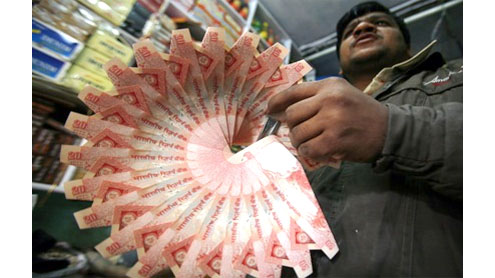
MUMBAI: In times of economic uncertainty, investors are routinely advised to hold on to cash. But with slowing growth and a difficult economic outlook, even companies are hoarding cash.
As a result, huge cash reserves are not being put to productive uses like expansion, acquisition and investment in new businesses, hurting growth. Cash and bank balances have hit a three-year high in nearly four of the top 10 sensex companies (excluding banks and financial services firms). Leading the companies that have accumulated cash in a big way are Reliance Industries, Infosys, Coal India and Wipro. Their aggregate cash and bank balances totalled Rs 79,652 crore at the end of 2011-12, data with the Centre for Monitoring Indian Economy showed.These companies have added Rs 21,645 crore to their cash balances in the past year with RIL alone adding Rs 12,463 crore to its kitty. In all, 23 of 41 companies on the NSE-50 (Nifty) list, excluding banks and financial services firms, have seen a rise in cash holdings in the last one year.
Cash, bank balances rise in 45 out of 85 companies
Among the BSE-100 firms, cash and bank balances have gone up in nearly 45 out of the 85-odd companies (excluding banks and financial services firms).Companies typically use cash surplus to finance acquisitions and expand operations. When they do not pursue such opportunities, they use the cash to pay dividends to shareholders and buy back shares from the market. But cash-rich companies, which have turned wary due to rising costs amid slowing growth, have not been disbursing dividends in a big way this year. The majority of companies on the sensex have either reduced payouts or have maintained it at the same level.
Companies are not willing to expand as they are unsure of the growth projection this year, market observers said. “Most companies are cautious about deploying money in uncertain times,” said Deven K Choksey, managing director (MD), KR Choksey Shares and Securities. Kishor P Ostwal, MD, CNI Research, an equities research provider, agrees. “Buying back shares and not using cash to make strategic acquisitions would not make much sense and would not be liked by investors. Conserving cash is not a bad idea but companies have to use it judiciously,” he said.
Information technology (IT) companies alone have accumulated huge cash reserves over the years. The top three IT firms have cash and bank balances aggregating Rs 30,541 crore at the end of 2011-12, a 23% rise compared to the previous year. “IT companies are waiting for valuations to come down, especially in Europe (for making acquisitions),” Choksey said.
The sharp depreciation in the rupee has put them on a wait-and-watch mode.Incidentally, the huge cash reserves with RIL resulted in a sharp rise in other income for the company. About 42% of the firm’s profit before tax came from other income in the last quarter of 2011-12, prompting concerns about the adverse impact of money not being deployed in businesses. The company though has been talking about deploying its huge cash reserves.
RIL chairman Mukesh Ambani after a meeting with PM Manmohan Singh last December had said that the company would invest Rs 70,000 crore. Investors are waiting for action on this front since the company generates up to $1 billion in free cash every quarter. “It is high time the company clearly pronounces its cash deployment plan. Else, this factor may remain a huge overhang on the performance of the stock,” an analyst said.
RIL on June 7 sought to dispel those worries and announced an $18-billion investment plan in the next five years. The company is in the midst of a $2-billion share buyback plan, the largest in Indian corporate history and has acquired 2.7 crore shares valued at Rs 1,929 crore. RIL recently announced a dividend payment of Rs 2,941 crore, the highest in the company’s history.RIL officials say that the company has been finding it difficult to make fresh investment due to lack of regulatory approvals. – TOI











